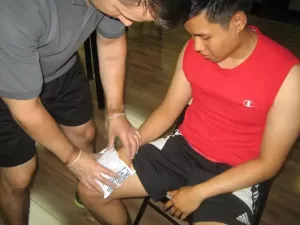
If you need cardiopulmonary resuscitation (CPR) training credentials, San Francisco CPR is the answer to your problems. San Francisco CPR has a variety of CPR training programs for healthcare providers and the public, offered at the most affordable rates in the city. Other training providers cannot compare with the quality of training at San Francisco CPR, nor with the rates that programs are offered.
There is an online enrolment form that students can use to sign up for a CPR class. Enrolment forms can also be send through e-mails and over the telephone. If you plan on calling or enrolling in person, make sure to conduct your business during regular operating hours.
CPR training credentials
CPR training credentials are awarded to a students once they finish their enrolled program. They need to pass the certification exam – a skills and written test – in order to become a certified rescuer. Credentials are valid for a total of 24 months before they have to be renewed. Only certificates that are valid qualify for renewal.
In the case that your training credential has expired before you had a chance to renew it, you will have to take the training program again.
CPR programs
CPR classes are divided into two categories. Basic Life Support teaches CPR management skills before medical help arrives while Advanced Life Support teaches medical management of cardiac arrest. Cardiac arrest is used to describe a situation where the heart is not beating and cannot pump blood to the rest of the body. This can happen due to a heart attack or a similar cardiovascular and respiratory emergency.
There are three BLS programs and two ALS programs. There are three re-certification programs available at San Francisco CPR.
Basic Life Support training
- Heartsaver CPR/AED – general public; 4 hrs. (no re-certification); 1-person CPR, first aid, and AED training
- Heartsaver CPR/AED (C) – HCPs; 4.5 hrs. (no-recertification); 1-person CPR, first aid, and AED training
- Basic Life Support for HCPs – 4.5 hours (re-certification: 4 hrs); 1-person and 2-person CPR, 2010 BLS guidelines, first aid, and AED training
Advanced Life Support training
To qualify for ACLS training, students need to have a BLS for HCP training credential. They also need to pass the pre-test (a skills and written test) to qualify.
- Advanced Cardiac Life Support (ACLS) – ACLS teaches trainees to manage adult-aged victims. Advanced Life Support includes the use of equipment, diagnostic exams, and medication. Trainees learn how to use bag valve masks and ECGs, read ECG tracing, and give epinephrine to an adult victim. ACLS is 16 hours long, completed in two days (re-certification: 5-6 hrs).
- Pediatric Advanced Life Support (PALS) – PALS teaches trainees about the management of pediatric patients. Pediatric patients are people younger than 18 years of age. Giving CPR to an infant or a young child is very different from giving it to an adult. Pediatric pharmacology and assessment are likewise different from adult assessment and pharmacology. PALS is 14 hours long, completed in two days (re-certification: 6 or 8 hrs).
